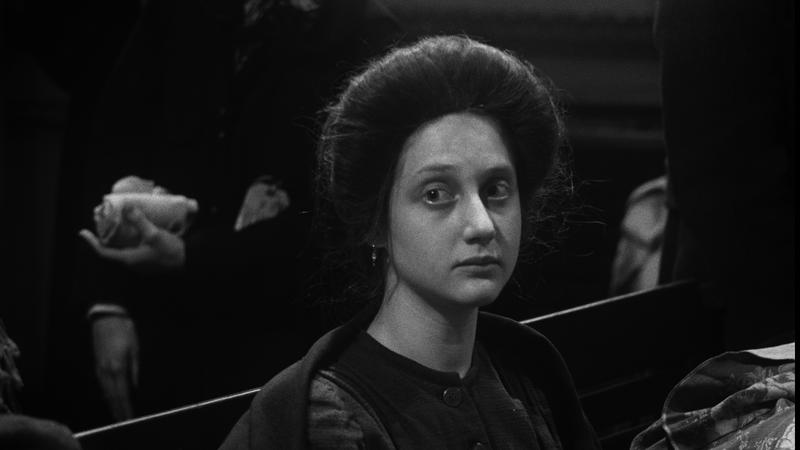
Published March 7, 2022
“At least he ended up with the one he loved. He didn’t really love his wife.” I was struck by this comment from a fellow theatergoer after viewing Joan Micklin Silver’s recently restored 1975 film Hester Street. It seemed so thoroughly to miss the point of the film. Hester Street might seem like an early version of what has become a stock story: A rogue non-believer, raised in a dogmatic community, casts off the shackles of religion and finds happiness. But the movie and its source material, Abraham Cahan’s 1896 novella, Yekl, are less about finding love or self-fulfillment than about the confrontation between traditionalism and the intellectual and material mores of America.
Modern iterations of this tale abound, from TLC’s Breaking Amish to Netflix’s Unorthodox and My Unorthodox Life. These shows, which follow defectors from traditional religious sects, seem to serve two purposes. First, they offer a window into communities that set clear standards for behavior, which is intriguing in a time of vanishing rules for even basic etiquette. Second, as more Americans walk away from religion, such shows tend to vindicate the choices of the viewing public; they present secular life (often referred to as “the real world”) as a source of redemption.
Unorthodox and My Unorthodox Life (a dramatic miniseries loosely based on Deborah Feldman’s memoir and a reality show, respectively) offer particularly stark versions of this contemporary fairy tale. Both feature formerly Orthodox Jewish women who flee repressive religious systems, to be rewarded almost immediately with better wardrobes, careers, and love lives.
In My Unorthodox Life, this moral framework is all but spelled out. It is produced by and stars Julia Haart, a former housewife who left her community and family in 2013 and embarked on an immensely successful fashion career. Not long after launching her own shoe line, Haart swiftly became the co-owner and CEO of the global modeling agency Elite World Group (though she was very recently fired from her CEO position). Along the way, she married Italian billionaire Silvio Scaglia, the agency’s other co-owner. Haart’s fabulous wealth is a major theme of My Unorthodox Life’s first season—as with many reality shows, it features a parade of designer clothes and luxury vacations. But she ties this success to her defection from Orthodox Judaism. In a scene in which Haart comforts her daughter Batsheva, who has remained hurt at her mother’s abrupt abandonment of her children years before, Haart gestures toward their Hamptons estate, saying, “But look where we are!” Batsheva concedes that she is “very thankful.” It is a sort of reverse prosperity gospel: The farther away from religion they go, Haart suggests, the more successful they will be.
Stories about leaving religion tend to be told by those who have left, and so they often emphasize the bravery of that choice. Hester Street, by contrast, acknowledges both the temptation to leave and the commitment required to stay. The religious figures in Cahan’s fiction are rarely caricatures; in Yekl, they are noble. Hester Street also offers a story of a blunt encounter between traditionalism and modernity, but one in which religion is not the enemy and its defectors are not heroes. This is a testament to the insight and empathy of Cahan, who left Orthodox Judaism as a young man and went on to serve as editor of the prominent socialist, Yiddish-language newspaper, Forverts.
Directed by Silver and filmed in black and white—the better to evoke its 1896 source material—Hester Street often feels like a silent movie. There are long stretches with no dialogue, only ragtime-style music. The handsome and restless Yekl (played by Steven Keats) lives in the Lower East Side of New York, attends dances with a rotation of girlfriends, and does his best to forget the wife and child he has left behind in Russia. In an effort to rid himself of any hint of Jewishness, he shaves his beard, removes his skullcap, and changes his name to Jake. Jake does not pray or observe Jewish law; he ruthlessly mocks those who do.
When Jake is compelled to send for his wife following the death of his father, he treats her like a bad dream he’d like to shake, or like an unpleasant, lingering smell. Gitl, played by the luminous Carol Kane, is every inch the woman he has left behind: She arrives not knowing a word of English; her hair covered by a stiff, unfashionable wig; her person shrouded in a heavy peasant’s cloak. Worse, she believes in the religion Jake has abandoned. She is exactly the sort of person the heroines of Unorthodox and My Unorthodox Life are eager to escape, a bad memory made flesh.
Jake chops off their son’s long sidelocks, snaps at Gitl for not learning English quickly enough (despite his own thick accent), and remains in a constant state of low-grade fury at Gitl’s refusal to uncover her hair. Initially cowed by her husband’s brutish behavior, Gitl soon recovers. Her steeliness, youthful humor, and quiet dignity are buoyed by her faith. In a reversal of the terms set by Unorthodox and My Unorthodox Life, she is rewarded for this obstinate devotion.
Jake, who seems animated more by restlessness and financial insecurity than anything else, leaves Gitl for Mamie, a free-thinking woman of independent means. Determined to marry Jake, Mamie arranges to pay Gitl to divorce him. In the movie, Gitl’s stunned and pained silence at this offer from a mediator is mistaken for shrewd bargaining, and she is left with a small fortune.
Shortly afterward, Gitl receives a marriage proposal from a kind and devout young man who had boarded with Jake; the two plan to marry and start a grocery store with Gitl’s new wealth. There is no real reason to believe that Jake, who has essentially been purchased, will be any less confused or unsettled with Mamie than he was with Gitl, particularly since Mamie forfeited her savings—an important attraction—to secure him. Gitl, meanwhile, is content.
Joan Micklin Silver died a little over a year ago, on December 31, 2020. Her best-known films, Hester Street and Crossing Delancey, offer a refreshingly countercultural approach to the question of how to situate tradition in modern life. They also provide a kind of antidote to the glut of stories rooted in dogmatic materialism or careerism. Silver’s movies play with many of the themes at work in shows like My Unorthodox Life—how love and purpose and financial insecurity intertwine. But there is a moral clarity in Silver’s work; her protagonists do not find happiness simply by following their bliss. This reflects Cahan’s fiction. He possessed the grace and wisdom to write stories that drew from his life but that did not simply vindicate his choices.
Devorah Goldman, a senior editor at Mosaic magazine and contributing editor of American Purpose, is the Tikvah Visiting Fellow at the Ethics and Public Policy Center.
Devorah Goldman is EPPC’s Tikvah Visiting Fellow. Her work focuses primarily on medical policy, culture, and public bioethics.








